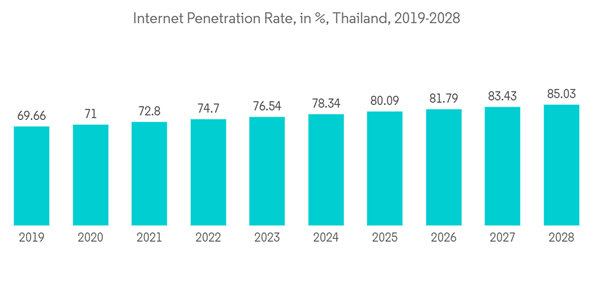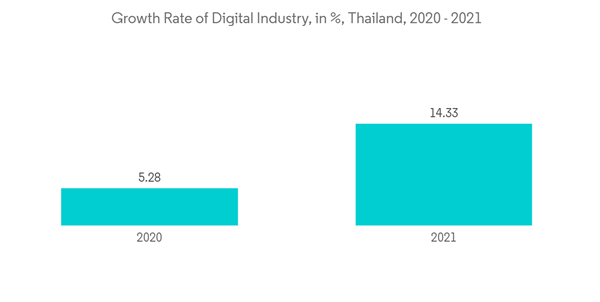Key Highlights
- The increasing demand for cloud computing among SMEs, government regulations for local data security, and growing investment by domestic players are some of the major factors driving the demand for data centers in the country/region.
- The upcoming IT load capacity of the Thailand data center market is expected to reach 260 MW by 2029. The country's construction of raised floor area is expected to increase to 0.6 million sq. ft by 2029.
- The country's total number of racks to be installed is expected to reach 31.5K units by 2029. Bangkok is expected to house the maximum number of racks by 2029. The average temperature is 26.3 °C in the north and 27.5 °C in the south and coast.
- There are close to 12 submarine cable systems connecting Thailand, and many are under construction. One such submarine cable that is estimated to start service in 2024 is SEA-H2X, which stretches over 5,000 km with landing points from Songkhla, Thailand.
Thailand Data Center Cooling Market Trends
Liquid-based Cooling is The Fastest Growing Segment
- Although Thailand is hot, it can feel even more desirable due to varying humidity levels. However, despite this potential data center cooling risk, Thailand is increasing its investment in digital infrastructure, and the rise of cloud computing and increased use of digital services in the country are driving demand for data centers.
- Data centers in Thailand typically require special cooling techniques to maintain optimal temperatures for servers and other equipment. The standard refrigeration technology in Thailand is direct expansion (DX) or chemical-based refrigeration technology and water chiller type.
- Direct development, also known as DX cooling, works on the principle of thermodynamics to transfer heat from one region to another. Using a refrigerant as a medium, heat is absorbed and removed in one area and released in another. Water coolers, on the other hand, can be air-cooled or water-cooled. They differ in how they release heat into the environment.
- Liquid cooling takes advantage of the superior heat transfer properties of water or other liquids to support efficient and cost-effective cooling of high-density racks, up to 3000 times more effective than using air. Long proven in mainframe and gaming applications, liquid cooling is increasingly being used to protect rack servers in data centers across the region.
- Direct liquid cooling (DLC) solutions consistently deliver impressive partial power usage effectiveness (PUE) values, typically ranging from 1.02 to 1.03. This outperformance, albeit marginal, places them ahead of even the most efficient air cooling systems by low single-digit percentages. It's important to note, however, that the energy efficiency gains achieved by DLC systems are not primarily attributable to improvements in PUE metrics.
- The reason behind this is that traditional servers are equipped with fans that draw power from the rack itself, and this power consumption is factored into the IT power section of the PUE calculation. These fans are an integral part of the data center payload and are responsible for maintaining proper cooling and airflow within the server infrastructure. As such, their energy usage contributes significantly to the overall power consumption within the data center, but it's not reflected in the PUE value, which focuses primarily on the efficiency of the facility's infrastructure.
- In Thailand, Facebook, Line, and YouTube are the top three social media and messaging platforms by current usage. In 2021, around 74.8% of social media users in Thailand were between 18 and 24 years old. In comparison, only 0.9% of users were 55 years and above. About 86% of users said they use Facebook Stories to learn about new products or services, while 74% said they are making more online purchases due to Facebook Stories. Such a trend is contributing to major data traffic through smartphones. Growing data traffic would increase the DC facilities in the country.
Liquid Cooling Offers Efficient Heat Transfer
- According to the Organization for Economic Co-operation and Development (OECD), GDP in 2021 grew by 3.5%. The province's GDP has grown significantly due to increased IT investment, creating new growth opportunities for Thailand's ICT market.
- Thailand will adopt hybrid cloud services rapidly over the next five years, with 67% of respondents agreeing to the adoption plan. The country's leading cloud customers include digital media, finance, retail, and manufacturing. Moreover, in 2020, Thailand achieved a score of 20.1 for the cloud regulation segment, ranking 11th in that segment in the Asia-Pacific region. In the context of investment under new Thai regulations, in May 2022, Alibaba Cloud, the digital technology and intellectual backbone of Alibaba Group, launched its first data center in Thailand to increase its local businesses' digital innovation capabilities.
- The Thai government is working with IT companies to further develop the digital infrastructure. For example, the governments of Thailand and Vietnam made a (MoU) on IT infrastructure, cloud computing, social network management, digital transformation, and the development of the digital economy. ICT market leaders are planning to roll out 5G networks in both urban and rural areas. For example, Ericsson is working with King Mongkut's University of Technology Thonburi (KMUTT) to help Thai students build 5G ICT skills for the future.
- Additionally, government investments aimed at fostering the advancement of various technologies, including 5G, artificial intelligence (AI), Internet of Things (IoT), machine learning, and big data, are on the rise. The advent of digital transformation is anticipated to fuel the expansion of the ICT market. To illustrate, AWS is actively dedicated to bolstering the Thai government's digital initiative, "Thailand 4.0." Consequently, the burgeoning ICT sector is poised to drive up demand for data center facilities, thereby necessitating advanced cooling solutions.
Thailand Data Center Cooling Industry Overview
The Thailand data center cooling market has achieved a moderate level of competitiveness and has witnessed significant advancements in recent years. Currently, a select group of major players, including Stulz GmbH, Schneider Electric SE, Vertiv Group Corp., Johnson Controls International PLC, and Mitsubishi Electric Hydronics & IT Cooling Systems SpA, hold prominent market positions in terms of market share.In March 2023, STULZ, a Hamburg-based company specializing in mission-critical air conditioning, made a noteworthy announcement regarding its industry-leading CyberAir 3PRO DX series. This announcement revealed that certain units within this series are now equipped to utilize the environmentally friendly refrigerant R513A, characterized by its low global warming potential (GWP). This groundbreaking development underscores STULZ's unwavering commitment to delivering the most sustainable air conditioning systems for data centers. Furthermore, the company has extended its efforts to transition more of its product portfolio to incorporate the use of R513A refrigerant.
Additional Benefits:
- The market estimate (ME) sheet in Excel format
- 3 months of analyst support
This product will be delivered within 2 business days.










